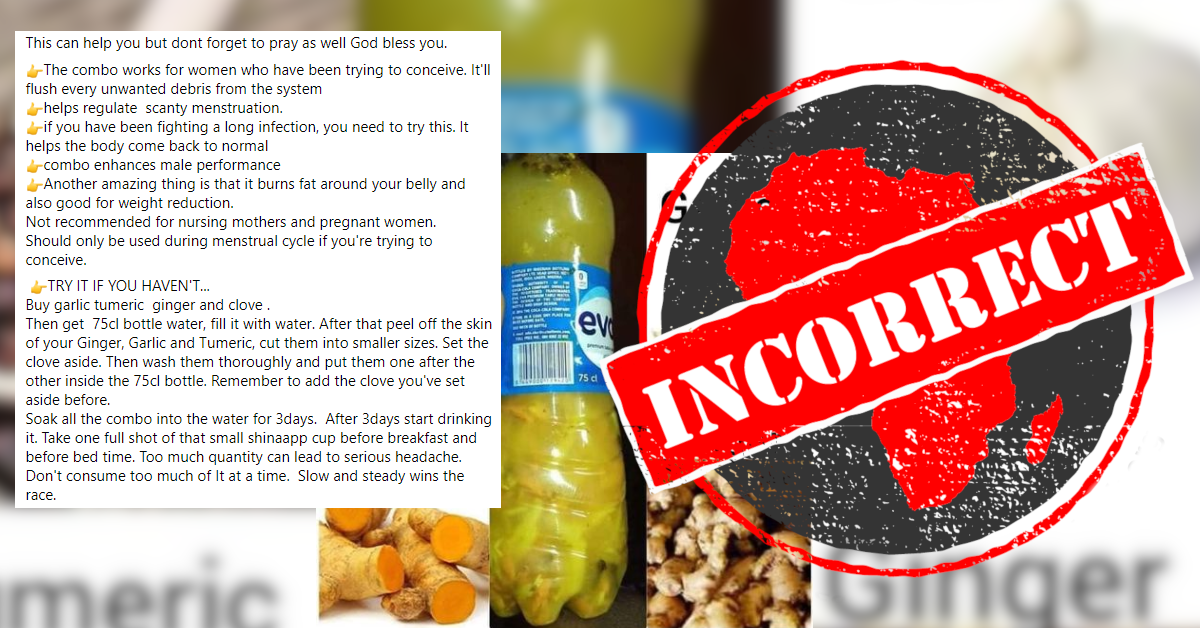A Facebook post shared in Nigeria in November 2020 advises people to drink a tea made from lemongrass and ginger “to detoxify the system”.
It says this is “the act of cleansing or flushing one’s system from toxins and unwanted substances” and gives directions for how to prepare the mixture.
Africa Check has previously debunked similar claims that teas and potions made from common herbs and foodstuffs help the body “detox” or cure diseases.
Detoxing the body and detox diets have been widely shown to be ineffective and unnecessary.
Is this lemon and ginger concoction any different?

We asked Jacob Awobusuyi, professor of medicine in the faculty of clinical sciences at Lagos State University in southern Nigeria, whether people should follow the advice in the Facebook post.
“There is no scientific proof a home remedy like this works,” he said. “There are a number of processes involved in ‘detoxifying’. If you come up with a treatment, you have to be specific. What is being detoxified that the liver cannot handle? Why do you have to use herbal preparations?”
He suggested people ask the following questions about herbal preparations: What does the preparation do? How does it work? What are the active ingredients? Have there been any medical trials to prove its effectiveness?
Awobusuyi reiterated that the body has its own cleansing mechanisms and there is no scientific evidence to back this detox claim. It should be disregarded. – Catherine Olorunfemi
It says this is “the act of cleansing or flushing one’s system from toxins and unwanted substances” and gives directions for how to prepare the mixture.
Africa Check has previously debunked similar claims that teas and potions made from common herbs and foodstuffs help the body “detox” or cure diseases.
Detoxing the body and detox diets have been widely shown to be ineffective and unnecessary.
Is this lemon and ginger concoction any different?

‘No scientific evidence’
We asked Jacob Awobusuyi, professor of medicine in the faculty of clinical sciences at Lagos State University in southern Nigeria, whether people should follow the advice in the Facebook post.
“There is no scientific proof a home remedy like this works,” he said. “There are a number of processes involved in ‘detoxifying’. If you come up with a treatment, you have to be specific. What is being detoxified that the liver cannot handle? Why do you have to use herbal preparations?”
He suggested people ask the following questions about herbal preparations: What does the preparation do? How does it work? What are the active ingredients? Have there been any medical trials to prove its effectiveness?
Awobusuyi reiterated that the body has its own cleansing mechanisms and there is no scientific evidence to back this detox claim. It should be disregarded. – Catherine Olorunfemi
Republish our content for free
For publishers: what to do if your post is rated false
A fact-checker has rated your Facebook or Instagram post as “false”, “altered”, “partly false” or “missing context”. This could have serious consequences. What do you do?
Click on our guide for the steps you should follow.
Publishers guideAfrica Check teams up with Facebook
Africa Check is a partner in Meta's third-party fact-checking programme to help stop the spread of false information on social media.
The content we rate as “false” will be downgraded on Facebook and Instagram. This means fewer people will see it.
You can also help identify false information on Facebook. This guide explains how.





Add new comment